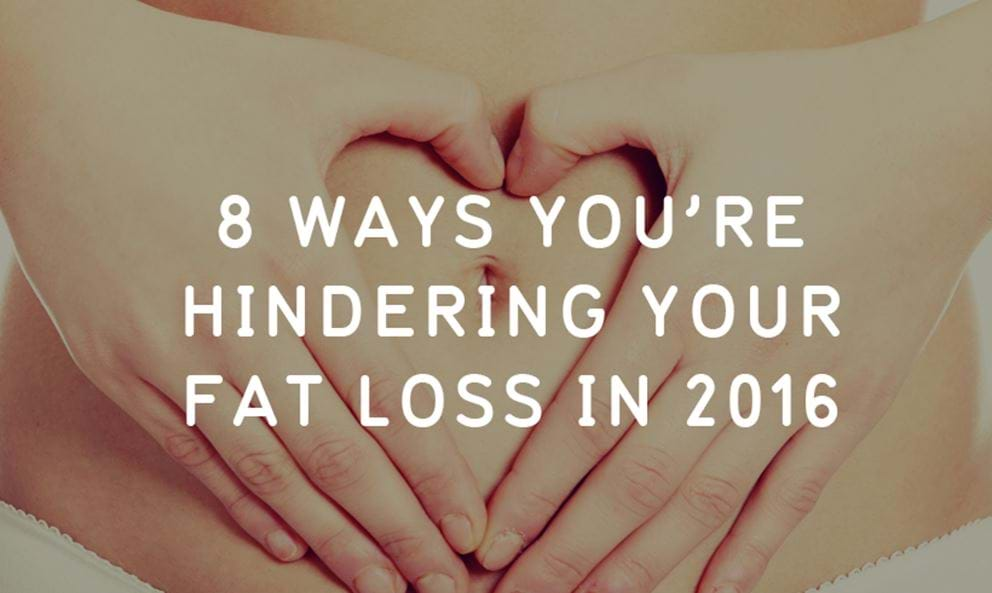8 ways you're hindering your fat loss in 2016

With 2016 now well and truly upon us, and with New Year’s resolutions in full swing, it’s important to make sure your fat loss goals aren’t sabotaged in their infancy.
Here’s a list of eight traps you should avoid falling into.
1.Too Much Cardio, not Enough Resistance
A good cardio routine is essential for getting your heart and lungs in peak condition, and ensuring good health – and yes, it’s also good for fat loss.
There is, however, such a thing as too much cardio. On your fat loss crusade, you’ll want to place the emphasis on short, intense cardio sessions two or three times per week (these intense “sprint” sessions are also known as HIIT – High Intensity Interval Training). This will help to keep the emphasis on fat burning, and prevent your central nervous system and joints from becoming worn out.
This will also prevent your body from entering a catabolic state; a condition where your body enters panic mode, and begins to break down muscle for fuel.
Be sure not to neglect weight training when pursuing your fat loss goals either. The more muscle you have on your frame, the higher your resting metabolic rate will be – great for shedding the pounds.
2.Not Getting your Macros Right
To function properly, your body needs the right amount of the various macronutrients; fat, carbohydrates and protein. Not getting enough of any of these three dietary essentials will result in your body malfunctioning in some way or another; usually by causing an imbalance in your hormones.
Aside from making you feel unwell, a hormonal imbalance is also a sure-fire way to sabotage your fat loss plan, and will cause unpredictable effects in terms of how your body metabolises fat; not to mention how it responds to different types of stress.
3.Fat-phobia
This ties in with the last point, but is worth mentioning on its own. Many initiates in the fat loss arena make the connection between the fat on their bodies, which they want to get rid of, and the fat on their plates.
This is a dangerous misconception, the bottom line is; eating fat doesn’t make you fat. A sustained caloric surplus makes you fat, and that can come from any macronutrient source.
It’s actually more likely in today’s world that you’ll be getting your surplus calories from sugar (a form of carbohydrate).
Save your hormones, and keep a reasonable amount of fat in your diet. Cut the sugar, instead.
4.Eating Processed Foods
Eating organic food can be a great way of ensuring ideal digestion, and preventing fat gain.
Whole foods are your friend, processed foods are your enemy. The more processed a food is, the more likely it is to spike your insulin and trigger your body’s natural fat storage protocols.
Aim for foods with a low glycaemic index score to avoid this trap.
5.Not Being Honest with your Tracking
To lose fat, you have to track your calories meticulously. One of the main problems faced by those who are new to calorie tracking, is they’ll begin by tracking the main foods in their diet, but will “forget” to track the calories in sauces, dressings, beverages, and so on. To get this right, you need to go the extra mile and make a record of absolutely everything you put into your body.
6.Starving Yourself
The human body is a carefully calibrated instrument. Above all, your body is programmed to ensure its own survival. If you cut back too many calories in one go, your body enters into starvation mode and will devour your muscles to ensure the right nutrients are getting to your organs.
Keep the calorie deficit small to prevent your body from cannibalising itself. You’ll burn fat more effectively and you’ll be healthier and stronger too.
7.Impatience
People on a weight-loss program often have a huge burst of motivation at the start, but then become disheartened over time. Weight loss is a marathon, not a sprint, and the process isn’t always linear. Some months you’ll lose a lot of fat in one go, some, you won’t. It’s essential to stick with your plan and stay on track. Find a friend or web community to keep you motivated and focused on your end goal.
8.Not Getting your Micros Right
Macronutrients are the key focus of most diet plans, but keep in mind that micronutrients – vitamins and minerals – are just as important when it comes to overall health and organ function.
Try your best to eat a balanced diet, including leafy greens. If you have trouble getting the right nutrients from your diet, take a multi-vitamin and dietary supplements to compensate. You’ll be amazed how much this will benefit your overall health and your fat loss journey.
Putting this tips into practice could really help your fat loss goals in 2016. So get started sooner, rather than later.


